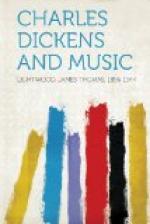That useful lady did as she was requested, and shortly afterwards the tuning of three fiddles was heard, which process, having been protracted as long as it was supposed that the patience of the orchestra could possibly bear it, was put a stop to by another jerk of the bell, which, being the signal to begin in earnest, set the orchestra playing a variety of popular airs with involuntary variations.
On one occasion Dickens visited Vauxhall Gardens by day, where ’a small party of dismal men in cocked hats were “executing” the overture to Tancredi,’ but he does not, unfortunately, give us any details about the number or kind of instruments employed. This would be in 1836, when the experiment of day entertainments was given a trial, and a series of balloon ascents became the principal attraction. Forster tells us that Dickens was a frequent visitor at the numerous gardens and places of entertainment which abounded in London, and which he knew better than any other man. References will be found elsewhere to the music at the Eagle (p. 47) and the White Conduit Gardens (p. 93).
Violin and Kit.
We meet with but few players on the violin, and it is usually mentioned in connexion with other instruments, though it was to the strains of a solitary fiddle that Simon Tappertit danced a hornpipe for the delectation of his followers, while the same instrument supplied the music at the Fezziwig’s ball.
In came a fiddler with a music-book,
and went up to
the lofty desk, and made an
orchestra of it, and tuned
like fifty stomach-aches.
The orchestra at the ‘singing-house’ provided for Jack’s amusement when ashore (U.T. 5) consisted of a fiddle and tambourine; while at dances the instruments were fiddles and harps. It was the harps that first aroused Mr. Jingle’s curiosity, as he met them being carried up the staircase of The Bull at Rochester, while, shortly after, the tuning of both harps and fiddles inspired Mr. Tupman with a strong desire to go to the ball. Sometimes the orchestra is a little more varied. At the private theatricals which took place at Mrs. Gattleton’s (S.B.T. 9), the selected instruments were a piano, flute, and violoncello, but there seems to have been a want of proper rehearsal.
Ting, ting, ting! went the prompter’s bell at eight o’clock precisely, and dash went the orchestra into the overture to the Men of Prometheus. The pianoforte player hammered away with laudable perseverance, and the violoncello, which struck in at intervals, sounded very well, considering. The unfortunate individual, however, who had undertaken to play the flute accompaniment ‘at sight’ found, from fatal experience, the perfect truth of the old adage, ‘Out of sight, out of mind’; for being very near-sighted, and being placed at a considerable distance from his music-book, all he had an opportunity of doing was to play a bar now




